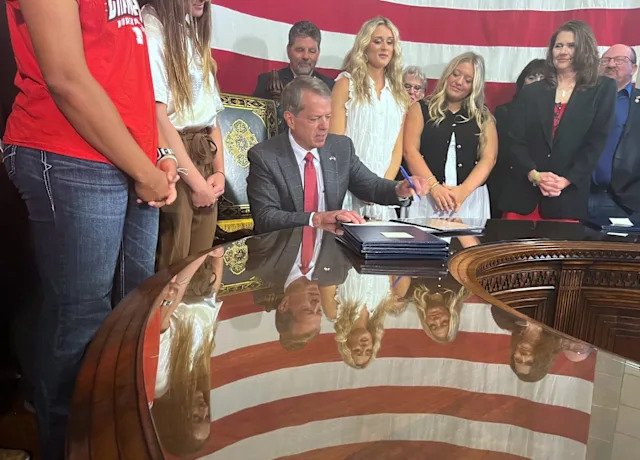In a move that’s already sending shockwaves across the country, Nebraska Governor Jim Pillen just signed one of the most controversial bills in the state’s recent history—banning transgender girls from participating in girls’ and women’s sports.
The legislation, which many expected to quietly fade after previous protests, has now become law. But what’s really lighting the internet on fire isn’t just the law itself—it’s what’s behind it.
Because here’s the kicker:
> Fewer than 10 transgender students have played sports in Nebraska over the past seven years.
Yes. You read that right. A full-scale legislative campaign—rallies, votes, headlines, and now law—built to stop something that… barely exists. So, what’s going on here?
The Politics of “Protection”
Supporters of the bill say it’s about fairness. “We’re protecting girls,” they argue. “We’re making sure women have a level playing field.”
But opponents—and they’re growing louder—see something very different. They see a small group of young people, often marginalized and misunderstood, being used as pawns in a larger political game.
This isn’t about Nebraska track meets or volleyball rosters. This is about fear. It’s about control. And it’s about turning cultural anxiety into legislative power.
—
But Let’s Talk About the Kids
Let’s move away from the politics for a moment—because at the center of this storm are real kids.
Imagine being a 15-year-old trans girl in Nebraska. Your entire world is already a maze of identity, transition, and self-worth. You step out to play a sport—not to dominate, not to break records, but to belong.
Now imagine your state just made a law telling you:
> “You’re not allowed here.”
Even if you’re the only one in your district. Even if you’ve done everything right. Even if sports were the only place you felt free.
—
Why This Story is Going Viral
Because people are realizing this isn’t about athletics. It’s about values.
It’s about whether we’re a state (and a country) that protects kids—all kids—or just the ones that make us comfortable.
It’s about whether we legislate based on facts—or on fear.
It’s about data—10 students in 7 years—versus drama.
It’s about empathy over outrage. And it’s about asking the one question every parent, coach, and lawmaker should be asking:
> “What happens to a child when you make them feel like they don’t belong anywhere?”
So What Now?
The law is passed. But the story isn’t over.
The national media is watching. Civil rights groups are preparing lawsuits. Nebraska school boards are scrambling for guidance. And social media? Well—it’s ablaze.
Hashtags like #LetThemPlay and #TransYouthBelong are trending. College athletes, teachers, and parents are speaking out. Even some conservative voices are asking: “Did we go too far?”
This is no longer a Nebraska issue. This is a human issue.
—
Final Thought
You can agree or disagree with the policy. That’s democracy. But if we’re going to write laws, let’s do it based on truth, not talking points. Because no matter where you stand politically, this much is clear:
> When laws start targeting kids—especially the most vulnerable ones—everybody should pay attention.
And when those laws are built on fear, not facts…
That’s not just politics.
That’s personal.
What You Can Do Next:
Share this story with someone who thinks the issue is “black and white.”
Follow trans athletes speaking out about their experiences.
Contact your local reps—ask for facts, not fear-mongering. Because we don’t just make laws in this country. We make culture. And culture, like sports, should be a place where everyone gets a chance to play.

